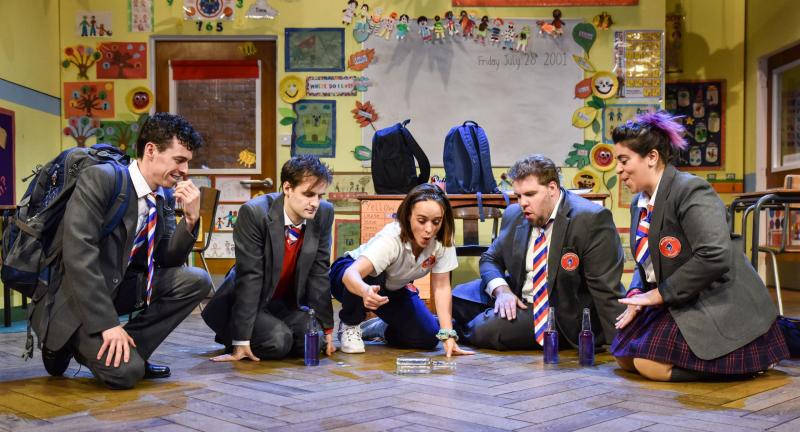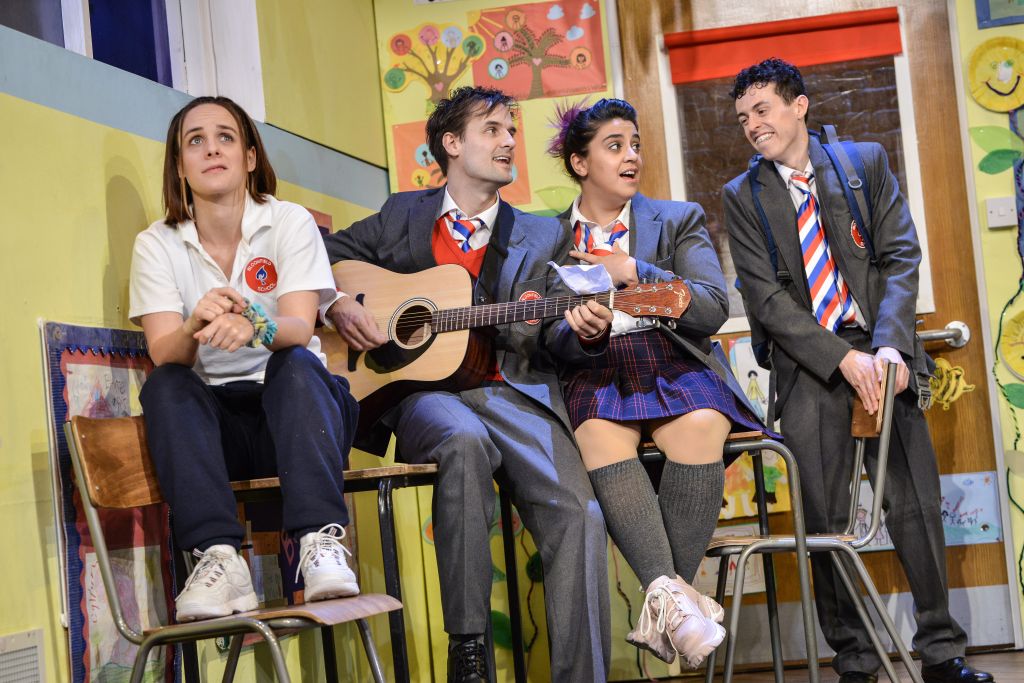Groan Ups, Vaudeville Theatre review - adding ambition and emotion to the mix | reviews, news & interviews
Groan Ups, Vaudeville Theatre review - adding ambition and emotion to the mix
Groan Ups, Vaudeville Theatre review - adding ambition and emotion to the mix
The ever-likable Mischief Theatre's latest stretches them in new if still-unfinished ways

If ambition were all, Groan Ups would get an A*.
The troupe met at LAMDA and have been fhave been friends and colleagues ever since, moving on from pub theatres and Edinburgh to take up apparently permanent residency in the West End and storm Broadway and, soon, the BBC, who will air The Goes Wrong Show later this year. All credit, then, at this decisive career point to find them pondering to what extent their trademark style can accommodate heartache and pathos, too. The short answer is very well indeed, and the result would be even better if the director Kirsty Parkwe Ward's staging were more rigorous and the narrative more firmly grounded in logic.
 As it is, I winced a fair amount to start with and, after the interval, smiled throughout while even feeling the odd lump in the throat – which is some way from the Mischief Theatre norm. It's little surprise, I suppose, that this crackerjack team of actors, three of whom (the two Henrys, Lewis and Shields, alongside Jonathan Sayer) double as the play's writers, should come into their own the nearer they get to playing the ages they are now. Come the second act, set at a reunion at the school where we have encountered them previously age six and on the cusp of adolescence, the play really finds its groove. That much is true even if the pivotal plot point, I fear, never makes a lot of sense.
As it is, I winced a fair amount to start with and, after the interval, smiled throughout while even feeling the odd lump in the throat – which is some way from the Mischief Theatre norm. It's little surprise, I suppose, that this crackerjack team of actors, three of whom (the two Henrys, Lewis and Shields, alongside Jonathan Sayer) double as the play's writers, should come into their own the nearer they get to playing the ages they are now. Come the second act, set at a reunion at the school where we have encountered them previously age six and on the cusp of adolescence, the play really finds its groove. That much is true even if the pivotal plot point, I fear, never makes a lot of sense.
The overextended opening scene introduces us to the school's "yellow group" and to a round-robin of shared intimacies, missed connections and defining character traits that will inform them across the years. Archie (Shields, pictured above) is the Disney-loving flamboyant one, who exults in being "precocious" and delivers a quick kiss towards the unsuspecting Spencer (a roaring-voiced Lewis), an unabashed lug who has a thing for glue, a dubious relationship with morality and an unfortunate habit of flattening any hamsters in his way. (The world being what it is, he needlesst to say ends up running a pet store.)
The self-dramatising and very posh Moon (Nancy Zamit, in wonderful form) likes indulging in excessively theatrical phone calls, while Katie (Charlie Russell, resembling by play's end a younger Kristin Scott Thomas) projects a future where she is married to Archie and has a "crippling mortgage". Moon tells the nebbishy, speech-challenged Simon (Sayer) that they might just possibly get together "when we're, like, super-old, like 30". But time, as it will, plays its customary tricks and finds a newly-smug Simon arriving for the reunion with a model girlfriend (or is she?) in tow only to be reduced to a near-suicidal wreck before a revelations-packed denouement plays itself out.
True to their classical training, the actors seem to be relishing the chance to investigate the psychic debris of life to a degree irrelevant to the physical mechanics of The Play That Goes Wrong, and more than once, I had visions of this exact same ensemble doing Uncle Vanya. (Lewis defty fields one particular line near the end worthy of Chekhov.) The text is sufficiently neatly laid out – things mentioned at one point find a comic or dramatic payoff later on – that you wish they'd pull back on the gross-out aspects (a character's prevalence, say, for poo) and tighten the grip whereby we chart Moon's journey from daddy-obsessed rich kid to a preening fantasist married to an (unseen) man whom she met on a Tinder date in Tibet: Zamit is nowhere more priceless than when she admits in passing that she likes "accidentally deep boys".
 At this point, having birthed four West End plays, the company feel like old friends, and it's a continual delight to chart the ease they communicate with one another and from there to an audience. Any worries that the invaluable Dave Hearn might here have been written out of the equation are dispelled as soon as he crops up to commandeer the second act as a wildly hearty classmate, Paul, who has ended up at the wrong address. (He still finds time to do a walrus impersonation, fear not.)
At this point, having birthed four West End plays, the company feel like old friends, and it's a continual delight to chart the ease they communicate with one another and from there to an audience. Any worries that the invaluable Dave Hearn might here have been written out of the equation are dispelled as soon as he crops up to commandeer the second act as a wildly hearty classmate, Paul, who has ended up at the wrong address. (He still finds time to do a walrus impersonation, fear not.)
And as Fly Davis's set morphs with the passing of the years – there's a neat sight gag involving the now grown-up Spencer and a pint-sized chair – you do come to feel for the characters, however much common sense sometimes works against the story: Archie, among other things, seems far too airily refined to be interested in the loutish Spencer, whose appeal in any case is presented via authorial fiat. Still, both actors land their climactic if overly sentimental encounter, and Bryony Corrigan is terrific as the deliciously-named Chemise (no relation to Comedy About a Bank Robbery's Caprice), whose cover is blown but not before the actress is given a scene-stealing chance to shine. What now awaits is a more keen – dare one say ruthless? – directorial eye and a pruning scissors (the post curtain call concert needs to go), at which point a sweet evening might itself morph into a lastingly memorable one, as well.
The future of Arts Journalism
You can stop theartsdesk.com closing!
We urgently need financing to survive. Our fundraising drive has thus far raised £49,000 but we need to reach £100,000 or we will be forced to close. Please contribute here: https://gofund.me/c3f6033d
And if you can forward this information to anyone who might assist, we’d be grateful.

Subscribe to theartsdesk.com
Thank you for continuing to read our work on theartsdesk.com. For unlimited access to every article in its entirety, including our archive of more than 15,000 pieces, we're asking for £5 per month or £40 per year. We feel it's a very good deal, and hope you do too.
To take a subscription now simply click here.
And if you're looking for that extra gift for a friend or family member, why not treat them to a theartsdesk.com gift subscription?
more Theatre
 Ragdoll, Jermyn Street Theatre review - compelling and emotionally truthful
Katherine Moar returns with a Patty Hearst-inspired follow up to her debut hit 'Farm Hall'
Ragdoll, Jermyn Street Theatre review - compelling and emotionally truthful
Katherine Moar returns with a Patty Hearst-inspired follow up to her debut hit 'Farm Hall'
 Troilus and Cressida, Globe Theatre review - a 'problem play' with added problems
Raucous and carnivalesque, but also ugly and incomprehensible
Troilus and Cressida, Globe Theatre review - a 'problem play' with added problems
Raucous and carnivalesque, but also ugly and incomprehensible
 Clarkston, Trafalgar Theatre review - two lads on a road to nowhere
Netflix star, Joe Locke, is the selling point of a production that needs one
Clarkston, Trafalgar Theatre review - two lads on a road to nowhere
Netflix star, Joe Locke, is the selling point of a production that needs one
 Ghost Stories, Peacock Theatre review - spirited staging but short on scares
Impressive spectacle saves an ageing show in an unsuitable venue
Ghost Stories, Peacock Theatre review - spirited staging but short on scares
Impressive spectacle saves an ageing show in an unsuitable venue
 Hamlet, National Theatre review - turning tragedy to comedy is no joke
Hiran Abeyeskera’s childlike prince falls flat in a mixed production
Hamlet, National Theatre review - turning tragedy to comedy is no joke
Hiran Abeyeskera’s childlike prince falls flat in a mixed production
 Rohtko, Barbican review - postmodern meditation on fake and authentic art is less than the sum of its parts
Łukasz Twarkowski's production dazzles without illuminating
Rohtko, Barbican review - postmodern meditation on fake and authentic art is less than the sum of its parts
Łukasz Twarkowski's production dazzles without illuminating
 Lee, Park Theatre review - Lee Krasner looks back on her life as an artist
Informative and interesting, the play's format limits its potential
Lee, Park Theatre review - Lee Krasner looks back on her life as an artist
Informative and interesting, the play's format limits its potential
 Measure for Measure, RSC, Stratford review - 'problem play' has no problem with relevance
Shakespeare, in this adaptation, is at his most perceptive
Measure for Measure, RSC, Stratford review - 'problem play' has no problem with relevance
Shakespeare, in this adaptation, is at his most perceptive
 The Importance of Being Earnest, Noël Coward Theatre review - dazzling and delightful queer fest
West End transfer of National Theatre hit stars Stephen Fry and Olly Alexander
The Importance of Being Earnest, Noël Coward Theatre review - dazzling and delightful queer fest
West End transfer of National Theatre hit stars Stephen Fry and Olly Alexander
 Get Down Tonight, Charing Cross Theatre review - glitz and hits from the 70s
If you love the songs of KC and the Sunshine Band, Please Do Go!
Get Down Tonight, Charing Cross Theatre review - glitz and hits from the 70s
If you love the songs of KC and the Sunshine Band, Please Do Go!
 Punch, Apollo Theatre review - powerful play about the strength of redemption
James Graham's play transfixes the audience at every stage
Punch, Apollo Theatre review - powerful play about the strength of redemption
James Graham's play transfixes the audience at every stage
 The Billionaire Inside Your Head, Hampstead Theatre review - a map of a man with OCD
Will Lord's promising debut burdens a fine cast with too much dialogue
The Billionaire Inside Your Head, Hampstead Theatre review - a map of a man with OCD
Will Lord's promising debut burdens a fine cast with too much dialogue

Add comment